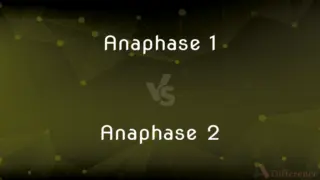B.E. vs. B.C.A. — What's the Difference?
By Tayyaba Rehman — Published on December 1, 2023
B.E. (Bachelor of Engineering) is an undergraduate degree in engineering, while B.C.A. (Bachelor of Computer Applications) focuses on computer applications and software development.

Difference Between B.E. and B.C.A.
Table of Contents
ADVERTISEMENT
Key Differences
B.E., which stands for Bachelor of Engineering, is an undergraduate degree that provides students with technical knowledge in various engineering disciplines. B.C.A., or Bachelor of Computer Applications, offers specialized knowledge in computer applications, software development, and programming.
In B.E., students can opt for various branches like civil, mechanical, electrical, and computer engineering, among others. B.C.A., in contrast, is tailored for those who have an inclination towards computer science but without the in-depth engineering aspects.
A typical B.E. course will have subjects such as thermodynamics, fluid mechanics, and circuit systems depending on the branch. B.C.A., on the other hand, would have subjects related to programming languages, database management, and software engineering.
While B.E. equips students to become engineers in their respective fields, B.C.A. prepares students primarily for roles in the IT and software sectors. Both B.E. and B.C.A. graduates have ample career opportunities, but they diverge in terms of technical depth and specialization.
Comparison Chart
Full Form
Bachelor of Engineering
Bachelor of Computer Applications
ADVERTISEMENT
Focus
Engineering disciplines
Computer applications and software
Typical Subjects
Thermodynamics, circuits, mechanics
Programming, database management
Career Path
Engineer in various sectors
IT professional, software developer
Duration
Generally 4 years
Generally 3 years
Compare with Definitions
B.E.
Offers specialization in various branches like civil, mechanical, and electrical.
After his B.E. in Civil Engineering, he worked on major infrastructure projects.
B.C.A.
Provides foundational knowledge in computer science without deep engineering aspects.
She opted for B.C.A. over B.Tech as she wanted a computer science foundation without the engineering depth.
B.E.
Equips students to become professional engineers.
After finishing her B.E., she became a certified engineer in the energy sector.
B.C.A.
An undergraduate degree in computer applications.
He pursued B.C.A. to deepen his understanding of software development.
B.E.
An undergraduate degree in engineering.
She completed her B.E. in Mechanical Engineering from a renowned institution.
B.C.A.
Focuses on software development and programming.
Her B.C.A. studies equipped her with skills in multiple programming languages.
B.E.
Focused on technical and practical knowledge.
Through his B.E. program, he gained hands-on experience in electronics.
B.C.A.
Prepares students for roles in the IT sector.
After his B.C.A., he joined an IT firm as a systems analyst.
B.E.
Often requires completion of projects and internships.
During his B.E., he interned with a leading automotive company.
B.C.A.
Incorporates subjects like database management and software engineering.
During her B.C.A., she developed a keen interest in database systems.
Common Curiosities
What is the primary focus of B.C.A.?
B.C.A. primarily focuses on computer applications and software development.
What does B.E. stand for?
B.E. stands for Bachelor of Engineering.
Can I study software engineering in B.E.?
Yes, software engineering can be a specialization in B.E.
Is B.C.A. equivalent to a computer engineering degree?
No, B.C.A. focuses on computer applications, while a computer engineering degree (like B.E. or B.Tech in Computer Engineering) is more comprehensive with engineering principles.
Can a B.C.A. graduate pursue a master's in engineering?
Yes, with the right prerequisites, a B.C.A. graduate can pursue a master's in engineering.
What are typical job roles after completing B.E.?
Typical roles include engineer, project manager, and consultant in various engineering sectors.
What roles can a B.C.A. graduate take up?
Roles such as software developer, IT analyst, and systems administrator are common for B.C.A. graduates.
Which offers a broader scope, B.E. or B.C.A.?
B.E. offers a broader scope in engineering, while B.C.A. is specialized in computer applications.
Which has a longer duration, B.E. or B.C.A.?
B.E. typically has a duration of 4 years, while B.C.A. is usually 3 years.
Is B.E. more challenging than B.C.A.?
Both have their own challenges. B.E. delves deeper into engineering concepts, while B.C.A. emphasizes software and computer applications.
Are there any common subjects between B.E. and B.C.A.?
Yes, subjects related to computer programming and basics of computing might overlap.
Does B.C.A. have a lot of programming?
Yes, programming is a fundamental part of the B.C.A. curriculum.
Are internships mandatory in B.E.?
Many B.E. programs require or encourage internships for practical exposure.
Which has a wider range of specializations, B.E. or B.C.A.?
B.E. offers a wider range of engineering specializations, while B.C.A. is focused on computer applications.
Can a B.E. graduate work in the IT sector?
Yes, especially those with a specialization in computer or IT engineering.
Share Your Discovery

Previous Comparison
Anaphase 1 vs. Anaphase 2
Next Comparison
Method Overloading in Java vs. Method Overriding in JavaAuthor Spotlight
Written by
Tayyaba RehmanTayyaba Rehman is a distinguished writer, currently serving as a primary contributor to askdifference.com. As a researcher in semantics and etymology, Tayyaba's passion for the complexity of languages and their distinctions has found a perfect home on the platform. Tayyaba delves into the intricacies of language, distinguishing between commonly confused words and phrases, thereby providing clarity for readers worldwide.













































